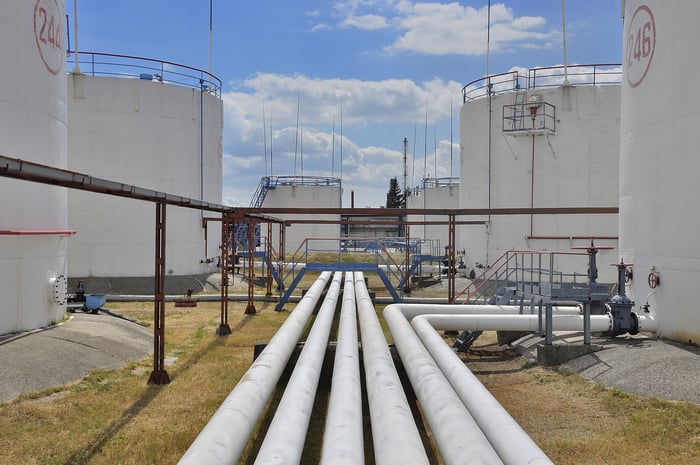Although Wall Street offers no guarantees, one near-constant has been the outperformance of dividend stocks over the long run.
Back in 2013, J.P. Morgan Asset Management, a division of JPMorgan Chase, released a report that compared the performance of public companies that initiated and grew their dividends between 1972 and 2012 to publicly traded companies that didn't offer a payout. The results showed a night-and-day difference. The profitable and time-tested dividend stocks averaged an annual return of 9.5% over four decades. Meanwhile, the non-dividend-paying companies averaged a poor 1.6% annualized return over the same time frame.
However, the irony of dividend investing is that often, the higher the yield, the lower the realized return. Since yield is a function of payout relative to share price, a company with a struggling or outright failing business model might sport an ultra-high yield but be a terrible investment.

Image source: Getty Images.
Thankfully, this isn't the case with all ultra-high-yield stocks. Investors wanting to generate serious dividend income can do so with companies yielding in excess of 7%. If you want to generate $5,000 in annual dividend income, investing $57,000, equally divided among the following four ultra-high-yield stocks that are sporting an average yield of nearly 8.8%, would do the trick.
Annaly Capital Management: 10.4% yield
Arguably one of the safest ways to maximize your dividend income is to put some money to work in mortgage real estate investment trust (REIT) Annaly Capital Management (NLY -0.32%). Annaly has averaged about a 10% yield for the past two decades and has doled out more than $20 billion in dividend payments since its inception in 1997.
Mortgage REITs like Annaly borrow money at low short-term lending rates and use this capital to purchase higher-yielding long-term assets, such as mortgage-backed securities (MBS). The goal is to maximize the difference between the average yield received from the MBS minus the borrowing rate. This difference is known as the net interest margin.
The interesting thing about mortgage REITs is their profitability cycle tends to be predictable. They perform poorly when the interest rate yield curve is flattening and/or the Federal Reserve is making quick or unexpected changes to monetary policy.
On the other hand, they perform well when the yield curve is steepening and/or the nation's central bank is slow-stepping monetary policy changes. Historically, an economic recovery from a recession results in this latter scenario, which is great news for Annaly.
With a 10.4% yield, Annaly is a good bet to put inflation in its place.

Image source: Getty Images.
AGNC Investment Corp.: 8.9% yield
Have I mentioned that mortgage REITs are an excellent place for investors to maximize their dividend income? AGNC Investment Corp. (AGNC -0.11%) pays out a rock-solid monthly dividend that, over the course of a year, equates to an 8.9% yield, as of Oct. 11. Further, AGNC has averaged a 10% or higher annual yield in 11 of the past 12 years.
The variables that dictate the push-pull of profitability for Annaly are effectively the same for AGNC Investment. The early stages of the economic recovery in the U.S. should encourage the nation's central bank to walk on eggshells with its monetary policy through 2022, if not 2023. The Fed offering a transparent outlook allows AGNC, Annaly, and their peers the opportunity to adjust their asset portfolios to maximize their net interest margin.
The other key for AGNC (and Annaly, for that matter) is it invests almost exclusively in agency securities. Agency assets are backed by the federal government in the event of a default.
As of the June-ended quarter, $85.5 billion of its $87.5 billion in held securities were agency-backed. While this added protection lowers the yield it receives from the MBS it purchases, it also allows the company to utilize leverage to inflate its profits.

Image source: Getty Images.
Sabra Health Care REIT: 8.1% yield
Another dividend stock capable of delivering bountiful returns is Sabra Health Care REIT (SBRA -0.58%). Even after reducing its quarterly payout last year by a third to $0.30, this operator, which is leasing nearly 450 skilled nursing and senior housing facilities, is still yielding a hearty 8.1%, with more-than-enough funds from operations to maintain its distribution.
As you can rightly imagine, the pandemic did a number on skilled nursing and senior-housing facilities last year. This unprecedented uncertainty was the catalyst that led Sabra Health Care to cut its payout by a third.
However, things are quickly improving for Sabra Health Care and its peers as coronavirus vaccination rates tick higher. The company has collected 99.8% of forecasted rents since the beginning of the pandemic, through August 2021, with rent deferrals totaling only $1.7 million.
What's more, Sabra Health Care looks like it's sitting on a gold mine as baby boomers age. Even after navigating its way through the pandemic, the company's average occupancy rate in its various facilities ranges from 72% to 82% and is only likely to head higher over time.
With Sabra currently trading below its book value, it looks like a true high-yield bargain in the healthcare REIT space.

Image source: Getty Images.
Enterprise Products Partners: 7.7% yield
A fourth and final ultra-high-yield dividend stock that can deliver in a big way for income seekers is midstream energy company Enterprise Products Partners (EPD 0.48%). Though its yield is the lowest on this list at 7.7%, Enterprise Products Partners has raised its base annual payout for 22 consecutive years.
Considering what happened last year, the idea of relying on oil stocks for dividend income might not sound all that palatable. When crude demand suffered an historic decline during the pandemic, the financial outlook and dividend payouts for a number of oil stocks suffered.
But this wasn't the case for Enterprise Products Partners, which is predominantly shielded from wild energy-price fluctuations, due to its role in handling the transport and storage of fossil-based fuels. The company operates approximately 50,000 miles of pipeline and can store 14 billion cubic feet of natural gas.
Enterprise Products Partners also benefits from the structure of its contracts with drillers. Knowing well in advance how much oil, natural gas, and natural gas liquids it'll be transporting, processing, or storing makes it easy for management to outlay capital for organic infrastructure expansion without compromising its payout or profitability.
At no point during the pandemic was Enterprise Products Partners' dividend in danger of being reduced, which is what makes this income stock such a surefire opportunity for investors.





